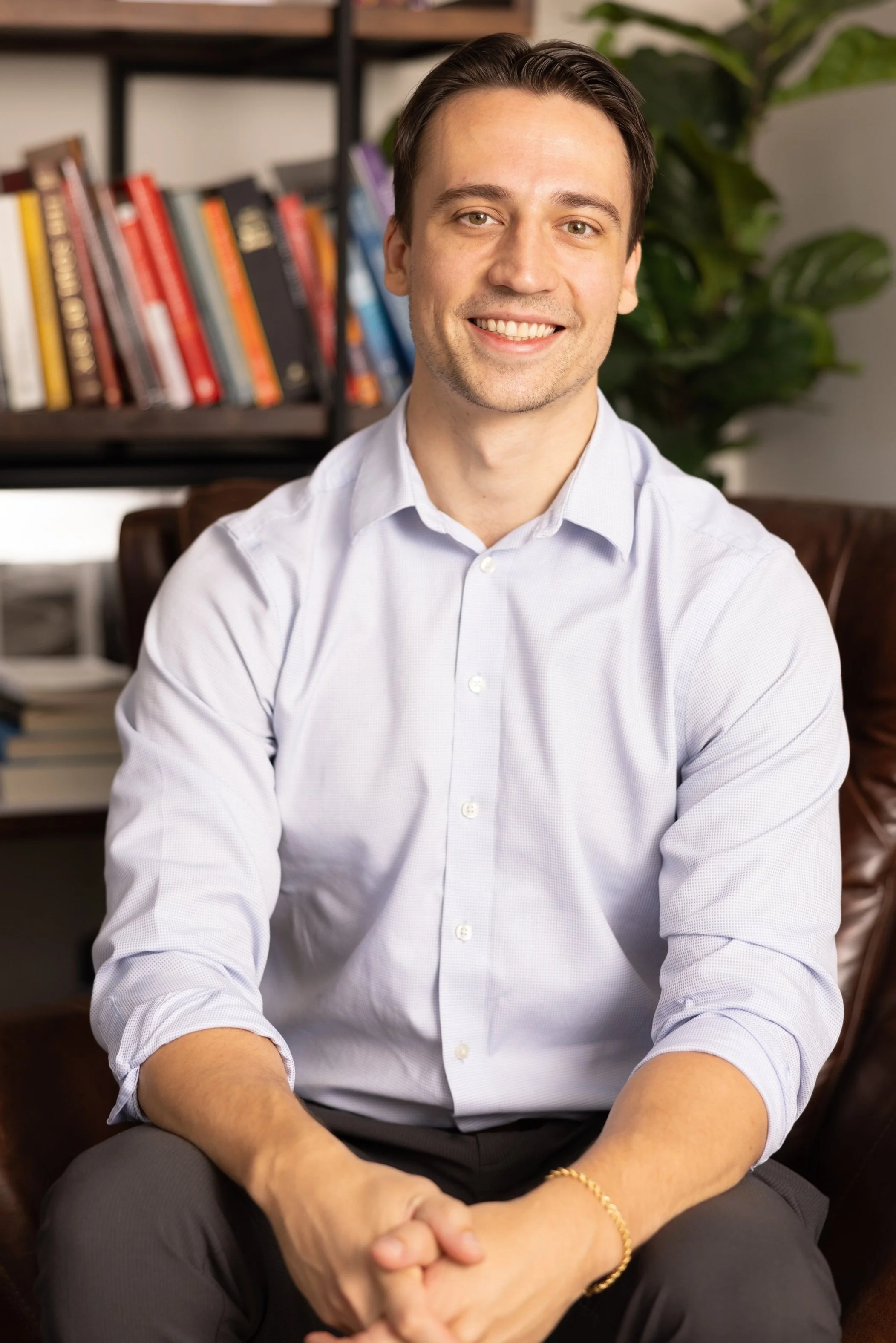Eric Rosin
Doctoral Student Clinician Working Towards Licensure
Supervised by Dr. Lee Kinsey
About Eric
Treatment
Therapy should be a place where you can come exactly as you are — conflicted, numb, overwhelmed, guarded, grieving, curious, or hopeful. I offer a space where all parts of you are welcome, including the ones that feel confusing, painful, or hard to put into words. My approach is grounded in depth-oriented therapy, but not limited to insight alone. Sometimes the work is about understanding patterns; other times, it’s about building the capacity to feel and relate in new ways, to build a mind that can bear itself, to stay present with yourself and with others. Whether we’re working with emotion, memory, relationship, or silence, the goal is the same: to help you feel more alive and more connected — not just to others, but to your own experience.
My clinical work is grounded in psychoanalysis, but I also draw from family systems theory, especially in my work with couples. Whether I’m working with an individual or a pair, my focus is on helping people notice and interrupt the unconscious dynamics that keep them stuck. In couples therapy, this often means exploring the emotional “system” both partners have co-created — and finding new ways to relate that feel more connected, honest, and alive.
Many of the people I work with are not looking to be told what to do. They’re looking to understand themselves more deeply, to stop abandoning parts of who they are, and to find language for what they’ve long carried alone. If you’re struggling with shame, desire, hatred, anxiety, relational conflict, or just feel like something essential keeps getting missed — I’d be honored to do that work with you.
Background
I’m currently a doctoral candidate in psychoanalysis at the Boston Graduate School of psychoanalysis. I hold a master’s degree in Mental Health Counseling from the same institution. Before becoming a therapist, I studied English literature and psychology at the University of Massachusetts, Amherst — disciplines that continue to inform my approach to language, symbol, and psychic life.
Before beginning clinical work, I also worked in neuroscience research at Massachusetts General Hospital. While my clinical interests have always leaned toward the symbolic and subjective, that early research reflects my longstanding commitment to disciplined thinking, attention to detail, and the layered study of brain and mind — two very distinct things.
I’ve spent years in my own psychoanalytic treatment (as well as periods with Jungian and Rogerian therapy) and bring that experience into the room — not just as theory, but as lived knowledge. I believe that a therapist can only take someone as far as they themselves have gone.
I also meet weekly with both a psychoanalyst and a humanistic/family systems therapist for supervision. Supervision is essential to my work — it ensures that I stay self-reflective, ethically grounded, and open to perspectives beyond my own, so I can offer the deepest possible presence to the people I work with.
I’ve also lived and worked abroad, including a year in Medellín, Colombia, where I deepened my understanding of culture, unconscious communication, and the emotional terrain of belonging.
Publications & Writing
My clinical and intellectual work is informed by a commitment to psychoanalysis as a living, evolving discipline — one that speaks to trauma, desire, and the complexity of being human.
My essay “The Wound I Can Author,” a meditation on the symbolic dimensions of cutting, has been accepted for publication in Psychoanalysis, Culture & Society, a peer-reviewed journal in the psychoanalytic field.
I am the first author of a peer-reviewed paper on Alzheimer’s disease published in the Journal of Alzheimer’s Disease, cited over 80 times. In total, I’ve co-authored four other peer-reviewed publications through the neurochemistry laboratory at Massachusetts General Hospital.
Currently, I’m completing essays on couples therapy, the defense of psychoanalysis in a culture of clinical tools, and the symbolic structure of trauma — each integrating clinical theory with experiential depth. Once finalized, I’ll be seeking publication for these as well. Writing, for me, is not separate from the work — it’s a continuation of the same search: to give form to what is often left unsaid.
Modalities
Emotionally Focused Couples Therapy
Psychoanalytically Oriented Therapy
Cognitive-behavioral Therapy (CBT)
Acceptance & Commitment Therapy (ACT)
Sex Therapy
Areas of Focus
Men’s Issues - eg. sexuality & anger
Couples & Families
Personality Disorders
Complex Trauma
Cognitive & physical disability
Schizophrenia/Psychosis
Finding the right therapist is tough. Let us help.
We offer a free, 15-minute, phone consultation to help you make sure Kinsey & Associates is the right fit for you, your relationship, or your family.

